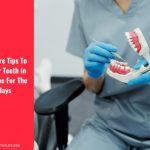
Teeth grinding. It’s likely you’re doing it far more than you realize. In fact, it’s thought that excessive teeth grinding, also known as bruxism, could be affecting up to a third of the population. For most people, it’s entirely involuntary and usually occurs during sleep, which is why so many of us don’t even realize we’re doing it.
Because so many people don’t realize they do it, symptoms are often associated with other conditions, with bruxism frequently overlooked as a potential cause. Bruxism can be harmful to your health and wellbeing, so it’s important not to ignore it if you think you might be suffering from it. Here’s how teeth grinding could impact your health.
Teeth and Gums
The most obvious effect that teeth grinding can have is on your teeth and gums. The pressure from frequent grinding and clenching causes teeth to wear down through attrition. You may notice additional tooth sensitivity, due to the wearing down of the enamel that surrounds the tooth. As the teeth wear down, fractures may begin to appear that require fillings or dental crowns to restore. This can also lead to gum disease. Some people report biting or chewing the inside of their cheeks.
Head

(Source: Pexels)
Headaches are another common symptom of those who suffer from bruxism.
According to the Bruxism Association, bruxists are three times more likely to suffer from headaches than non-bruxists. These types of headaches are caused by muscle tension as a result of clenching the jaw and typically begin in the temples. In more serious cases, teeth grinding can lead to migraines.
The temporomandibular joint (TMJ) is located in front of the ear, in the spot where your lower jaw connects to the rest of the skull. When you grind your teeth, this puts intense pressure on the joint, which can result in pain. In some circumstances, your jaw can begin to click.
Bruxism can also cause earaches, sinus pain, and even tinnitus, due to the proximity of the ear canal to the TMJ.
Sleep
The average human needs seven to nine hours of sleep each night. Without proper sleep, we cannot function effectively. What’s more, poor sleep can make way for a whole host of health issues, including weakened immunity, high blood pressure, mood disorders and increased risk of heart disease and conditions like diabetes.
Bruxism can interfere with our sleep, with the quality of sleep affected. As it involves the tensing of muscles, your body cannot fully relax, thus preventing truly restful sleep. In severe cases, sleeping partners may complain of noises from the other person’s teeth grinding.
Muscles
It’s not just the muscles in your jaw that can be affected. Teeth grinding can also cause pain in your neck and shoulders. Doctors often liken it to the pain you feel after working out. If you wake up with a sore jaw, stiff neck or aching shoulders, bruxism could be the cause.
If you’ve experienced a few or all of these symptoms, you may be suffering from bruxism. If you suspect bruxism could be the cause of your symptoms, consult your dentist, who can discuss treatment options with you.
What causes it?
Bruxism can be attributed to a number of causes, including physical or psychological disorders and several lifestyle factors.
Psychological

(Source: Pexels)
Two of the biggest causes of bruxism are thought to be stress and anxiety disorders. Almost 70 percent of cases of teeth grinding are reportedly due to stress or anxiety problems. In a study undertaken on shift workers, it was discovered that those who suffered from work-related stress were more likely to experience bruxism.
Tackling stress and its underlying causes is important if you want to avoid excessive teeth grinding. Recommendations from the experts at the National Sleep Foundation include frequent exercise, taking a soothing bath before bed and engaging in relaxing activities to alleviate stress. For those who suffer from severe stress or anxiety, you should seek help from a medical professional.
Lifestyle
People who smoke or drink regularly are more likely to suffer from teeth grinding. Similarly, frequent drug users are more at risk, especially users of certain methamphetamines, ecstasy, and even some antidepressant medications. Caffeine, too, has shown to increase the likelihood of teeth grinding. If you drink more than six cups of coffee per day, you might be more at risk of suffering from bruxism.
Sleep

(Source: Pexels)
Sleep disorders that involve periods of wakefulness or disturbed sleeping patterns are most likely to contribute to teeth grinding. Sleep Apnoea is a common affliction, involving short periods during sleep where the sufferer stops breathing. This disruption in sleep can lead to involuntary muscle clenching and teeth grinding. Other conditions that can lead to bruxism include sleep paralysis, sleep talking and hallucinations.
Physical conditions that involve involuntary muscle clenching or tremors, such as Parkinson’s disease can also make you more vulnerable to bruxism.
While adults are most likely to be affected by teeth grinding, usually between the ages of 25 and 44, children can also be susceptible.
What can I do about it?
Currently, there is no cure for bruxism. By tackling some of the factors thought to cause bruxism, such as stress, you can reduce its impact. There are a number of treatment options that have been proven to help. One of the most commonly used is the occlusal splints. These are a type of mouthguard that prevents you from grinding your teeth. Mandibular advancement devices are also used.
For some people, alternative treatments have proved successful. Hypnosis and psychoanalysis, even meditation have reportedly helped sufferers minimize teeth grinding.
It might be that crooked or misaligned teeth are exacerbating your teeth grinding, in which case, braces might be a good treatment option to minimize the problem. Some dentists offer equilibration, which reshapes the surface of your teeth to allow them to fit together more smoothly.

(Source: Pexels)
The first step should be to visit your dentist. They can advise you whether they think you are suffering from bruxism and any suitable treatment options. If your teeth have been damaged, there are a range of options for restoring them to full working condition, from dental crowns to veneers.
If you think you might be suffering from excessive teeth grinding, don’t be concerned. There are lots of simple treatments designed to help tackle teeth grinding and look after your oral and overall health. Speak to a professional to get your teeth grinding under control.
About The Author:
Katy Carter is a writer specializing in all things health and wellbeing. She currently writes for Victoria Road Dental Clinic – a London based dental practice, educating people on the importance of good oral hygiene for their overall wellbeing.




